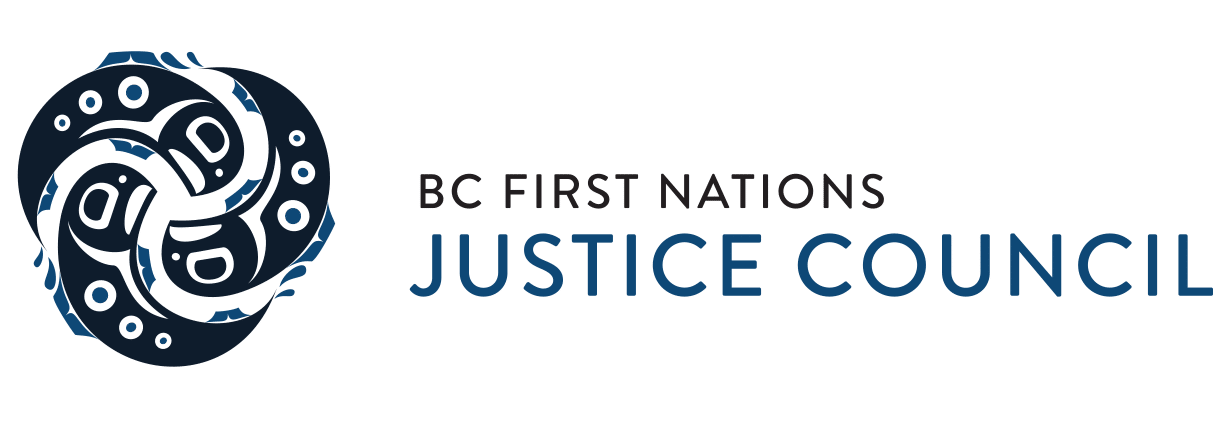BCFNJC’s Novel Approach to Justice System Transformation
First Nations in British Columbia continue to be disproportionately and negatively harmed by the criminal justice system. To transform this reality and address the poor justice outcomes experienced by First Nations and other Indigenous people, the BC First Nations Justice Strategy (the Strategy) was signed by the BC First Nations Justice Council (BCFNJC) and the Province in 2020. The Strategy was also endorsed the First Nations Leadership Council, through resolutions of the BC Assembly of First Nations, First Nations Summit, and Union of BC Indian Chiefs.
How is the BC First Nations Justice Strategy advancing true justice system transformation?
Providing a clear and comprehensive road map to the fundamental transformation of the justice system in BC, the Strategy advances 25 individual strategies and 43 lines of action along two tracks of change: 1) reforming the current justice system and 2) restoring Indigenous justice systems, legal traditions, and institutions.
The novel work under these tracks of change encompasses all areas of the justice sector, from prevention to policing to corrections, and is grounded in a holistic, culturally appropriate approach. Ultimately, the Strategy will:
- reduce the number of Indigenous people who become involved with the criminal justice system;
- improve the experience of Indigenous people who are involved with the justice system;
- increase the number of Indigenous people working within the justice system; and
- support First Nations to restore their justice systems and structures.
What informed the Justice Strategy?
The Strategy is a result of fulsome, meaningful engagement with First Nations and Indigenous communities and groups across the province. It has been shaped and informed by their collective wisdom and lived experience, the recognition and implementation of Indigenous Title and Rights, the respect for gender diversity and human rights of all Indigenous citizens, particularly 2SLGBTQQIA+ persons and Indigenous women and girls, and the implementation of the United Nations Declaration on the Rights of Indigenous Peoples (UN Declaration), particularly with respect to the justice sector.
What are Indigenous Justice Centres and how are they transforming the justice system?
Strategy 4 of the BC First Nations Justice Strategy calls for the creation a network of 15 Indigenous Justice Centres (IJCs) across the province. IJCs are transformative justice hubs from which Indigenous people can access a comprehensive range of legal services – from lawyers who have been trained to provide culturally appropriate services, to Elders and Knowledge Keepers who can support alternative pathways of healing and justice.
By housing and providing legal aid, Gladue services, and other supports and services that can help an Indigenous person navigate and exit the current justice system, IJCs are integral to Track 1 work of the Strategy. IJCs also provide a strong foundation for Track 2 work as they can be spaces to work collaboratively with First Nations and to develop justice solutions at the community-level, expand services, assert sovereignty over law, and revitalize Indigenous legal orders.
BCFNJC has made tremendous progress on establishing a network of IJCs. There are currently four physical IJC locations in Merritt, Chilliwack, Prince George, and Prince Rupert, as well as 1 virtual IJC that serves the whole province. In January 2024, BCFNJC established 5 additional Regional IJCs in Vancouver, Surrey, Kelowna, Nanaimo, and Victoria and is currently the process of working with communities that are interested in hosting one of the six smaller IJCs set to open in 2024, for a total of 15 physical IJC locations.
How do I learn more about BCFNJC’s novel approach to justice system transformation?
BCFNJC is undertaking empowering, ambitious, and first-of-its kind work with the implementation of the BC First Nations Justice Strategy and its Track 1 (reforming the current justice system) and Track 2 (restoring Indigenous justice systems, laws, and institutions) work.
Guided by and working with First Nations and Indigenous groups to transform the justice system, we recognize the unique, advantageous position BCFNJC holds in a province that is seeing advancements, sweeping changes, and legislative action with regards to reconciliation and the implementation of the UN Declaration on the Rights of Peoples. We are building a sustainable framework for the restoration of Indigenous justice systems, legal traditions, and institutions, and we want our work to benefit other First Nations and Indigenous Peoples across Canada. This will take time. We want to share the wisdom, learnings, and best practices we have gained from our challenges and successes, and we want to share in a way that is meaningful, impactful, and reflective of the leadership and immense contributions of First Nations in BC.
We look forward to opening our doors to our allies and accomplices and sharing the innovation, knowledge seeking, and learning that BCFNJC has undertaken to implement the Strategy. As we take the time needed to meaningfully do this, we would like to point people to the following sources to learn more about the Strategy and gain more insight into BCFNJC’s approach:
- Explore all 25 strategies on Tracking Justice. Tracking Justice is BCFNJC’s online information sharing and accountability tool that tracks the progress and impact of the BC First Nations Justice Strategy.
- View the About BCFNJC video to learn more about our organization
- View the Year in Review video to get an in-depth recap of BCFNJC’s progress toward service provision.
- For more information about the Indigenous Justice Centres, please visit bcfnjc.com/IJCs
Please contact [email protected] if you have further questions.
